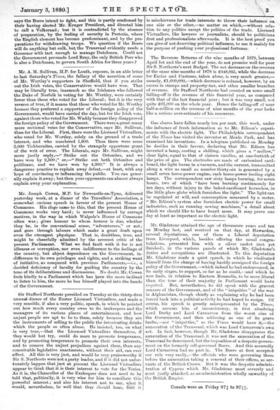Mr. Gladstone attained the age of threescore years and ten
on Monday last, and received on that day, at Hawarden, several deputations, one of them a Liberal deputation from Liverpool, which, besides offering the usual congra- tulations, presented him with a silver casket (not yet finished), in the various panels of which Mr. Gladstone's duties and occupations are illustrated. To this deputation Mr. Gladstone made a quiet speech, in which he vindicated himself from the charge of having hastily arraigned the foreign policy of the Government,—which indeed he had endeavoured, in its early stages, to support, so far as he could,—and which he now finds, in relation to Eastern Roumelia, to be more liberal than the tone of their majority in Parliament would have required. But, nevertheless, he did speak with the gravest censure of the Government, and of the " iniquities " of the war in Afghanistan, though chiefly as explaining why he had been forced back into a political activity he had hoped to resign. Of course, his speech is greatly misrepresented by the Times, which accuses him of inconsistency, in first absolving Lord Derby and Lord Carnarvou from the worst sins of the Government, and then adducing as one of its grave faults,—not " iniqui ties," as the Times would have it,—the annexation of the Transvaal, which was Lord -Carnarvon's own act. In fact, however, though Mr. Gladstone disapproves the annexation of the Transvaal, it was not the annexation of the Transvaal he denounced, but the imposition of a despotic govern- ment on the formerly self-governed Boers. And this assuredly Lord Carnarvon had no part in. The Boers at frat accepted our rule very easily,—the officials who were governing them before the annexation taking a renewal of their offices, as ser- vants of the British Crown. But it was the despotic adminis- tration of Cyprus which Mr. Gladstone most severely and most justly attacked, as an administration wholly unworthy of the British Empire.










































 Previous page
Previous page